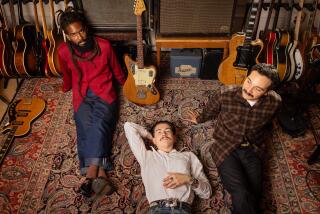Common takes rap believers on a soul-searching journey
- Share via
Few live performers today have the presence of the rapper Common, and Friday at the sold-out Wadsworth Theater, that riveting charisma allowed him to avoid the familiar hits-only format and take hip-hop believers on a soul-searching expedition for what he called the “one love,” the unifying force in music.
In a show that ranged from rushed, medley-style presentations to bare-bones DJ-and-MC old-school throwdowns to hip-hop history lessons and huge funk-rock eruptions, Common, backed by a six-piece band, worked the stage like an impassioned revolutionary. The remarkable jazzy soprano vocal of Floetry’s Marsha Ambrosius had almost stolen the show earlier in the night, but the second-billed duo’s dusky, swirling poetics were all but effaced by Common’s wordy energy.
Coming on with a vibe of militant cool, Common set the tone with the stark rap attack of “Soul Power,” working his way into the riveting “Time Travelin’ (A Tribute to Fela).” He relished the job of defining the moment for hip-hop and black history, touching on the mind-set of oppression, but always bringing it back to a triumphant message of freedom through knowledge and passion.
The intimacy of a basement party characterized the show, with Common stopping between songs to tell stories. He swung into a medley-like series of hits, including “Respiration,” from the Mos Def & Talib Kweli album “Black Star.” The acid-rap-rock song “Electric Wire Hustler Flower” exploded out of nowhere, with Common beating the stage with his mike stand, mangling it, then holding it up to band members’ heads like a rifle.
On a break called “Way Back,” he brought in the crowd on a series of older hip-hop hits, then sent the band offstage to rap over the turntable work of DJ Dummy. By the time he brought back the band for an extended version of his hit “The Light,” there wasn’t a person in the house who wasn’t singing his or her heart out. Common is now setting the standard for hip-hop’s potential to be spiritually radical and radically entertaining.
More to Read
The biggest entertainment stories
Get our big stories about Hollywood, film, television, music, arts, culture and more right in your inbox as soon as they publish.
You may occasionally receive promotional content from the Los Angeles Times.










